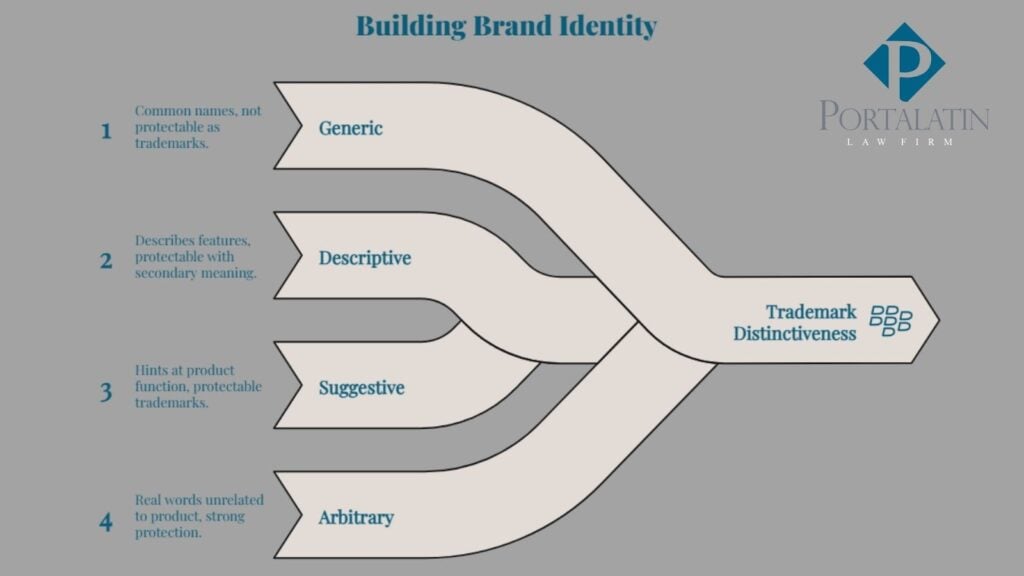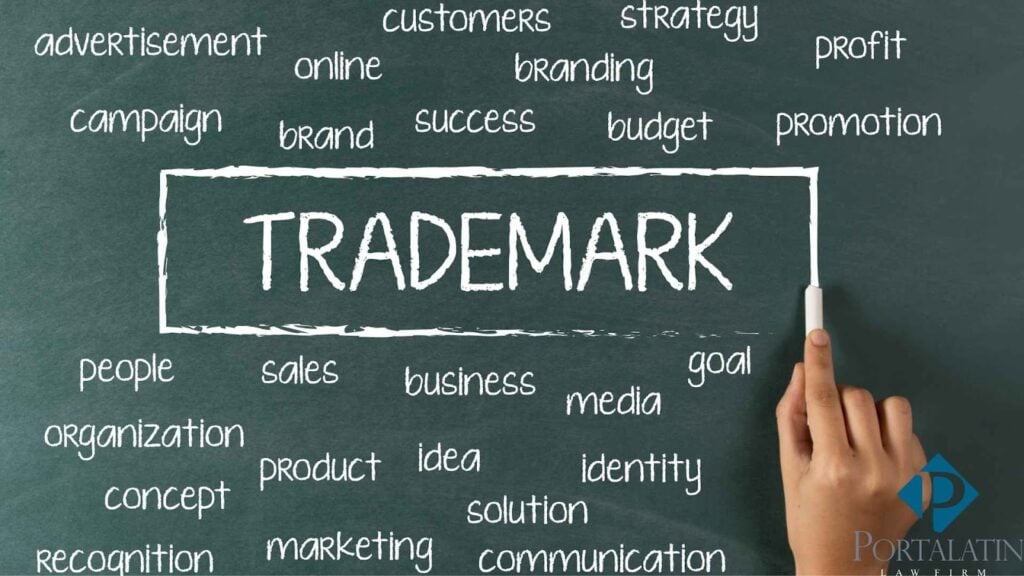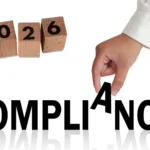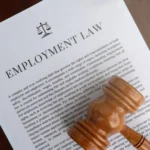A generic trademark is a word or phrase that names a type of product or service, like “Milk” for dairy or “Laptop” for computers, and can’t be legally protected by a federal trademark because it’s too common. If your business name or product is an “everyday name”, you may be using a generic term without realizing the risk.
Portalatin Business Law Firm helps Florida entrepreneurs and international founders secure strong, protectable trademarks that support long-term business success. With trilingual service and a focus on aligning legal strategy with branding, we make the trademark process clear, strategic, and smooth.
Key Takeaways:
- Generic trademarks can’t be legally protected with a federal trademark because they identify the product type rather than the source.
- Distinctiveness is necessary for trademark registration, with the strongest marks being suggestive, arbitrary, or fanciful, while descriptive and generic terms always rank at the bottom of the scale.
- Entrepreneurs should avoid generic names early and consider legal guidance to secure strong, protectable trademarks that build long-term brand equity.
What Is a Generic Trademark?
A generic trademark is a word or phrase that simply names a type of product or service, like “E-ticket” for computerized reservation and ticketing or “Phone” for a mobile device. Because it doesn’t identify who made or sells the product, it can’t be protected under U.S. trademark law.
According to the USPTO, generic marks are unregistrable because they fail to distinguish a brand from others offering the same thing.
To register a trademark in the U.S., the name must be distinctive, and it needs to tell consumers where the product comes from, not what it is. For example, “Apple” is protectable when used for computers because it doesn’t describe the product itself. But trying to register a trademark for “Computer” would be immediately rejected if it was being registered for an electronic device that can input, process and produce information.
The scale of this issue is significant: over 737,000 trademark applications were filed in 2023 alone, and genericness or descriptiveness ranks among the top three reasons for rejection. That means thousands of businesses each year are turned away simply because their chosen name was too generic or descriptive to qualify.
Real-world examples of once-protected names that became generic include:
- Aspirin lost trademark status in the U.S. after becoming the standard term for pain relievers.
- Thermos became so widely used that it lost its brand identity and legal protection.
- Elevator once a brand, now just the word for the vertical transportation device.
Understanding this concept early can save time, money, and brand equity. At Portalatin Business Law Firm, we help founders identify strong, defensible names before they file. Our trilingual team confirms clarity for entrepreneurs from Latin America and beyond, making complicated trademark law feel like a business advantage, not a barrier.
Trademark Distinctiveness
Trademarks are evaluated on a distinctiveness scale, a spectrum that determines how strong or protectable a name is.
At the very bottom of that scale are generic terms, which can’t be registered because they describe a product’s category rather than its source. To qualify for federal trademark protection, a name must land higher on that spectrum.
The Spectrum: Generic, Descriptive, Suggestive, Arbitrary, Fanciful

The USPTO breaks trademarks into five categories:
- Generic: Common names for a product type (e.g., “Soap” for hand soap). Not protectable.
- Descriptive: Directly describe a feature or function (e.g., “Quick Dry Towels”). May become protectable if they gain “secondary meaning.”
- Suggestive: Hint at what the product does, but require imagination (e.g., “Coppertone” for sunscreen). Protectable.
- Arbitrary: Real words used in unrelated ways (e.g., “Apple” for electronics). Strong and protectable.
- Fanciful: Made-up words with no prior meaning (e.g., “Kodak”). Highest level of protection.
Knowing where your name falls is key. If it’s generic or merely descriptive, it will likely be rejected. But if it’s suggestive or stronger, it stands a better chance of approval and legal protection.
Why Distinctiveness Matters in Registration
Distinctiveness is what gives a trademark its power. It’s what allows customers to connect a product or service to your brand, and no one else’s. Without distinctiveness, there’s no way to stop competitors from using similar terms. That’s why the USPTO uses this spectrum to judge every application it receives.
Many filings are refused due to a lack of distinctiveness, often because the applicant used a generic or descriptive name.
Can You Register a Generic Term with Modifications?
In most cases, the USPTO won’t allow you to register a trademark for a purely generic term, but there are situations where adding certain elements can make a name registerable. That said, it’s not as simple as just slapping a logo or design on a generic word.
Here’s a common strategy and its limitations:
Combining a Generic Term With a Distinctive Word
Pairing a generic word with something distinctive can improve your chances. For example:
- “Nova Bread Co.” is stronger than just “Bread.”
- “Glow Computers” offers more identity than “Computer.”
The added word needs to be unique enough to create brand distinction. But if you use common combinations like “Best Bread” or “Fast Computers,” the mark may still be refused as merely descriptive, which sits just above generic on the distinctiveness scale.
How to Avoid Choosing a Generic Brand Name
Choosing the wrong name can block your trademark before your business even launches. That’s why smart entrepreneurs treat naming as both a branding and legal decision from the start. Avoiding a generic name gives you a better shot at trademark protection and builds a stronger, more memorable identity.
Tips for Startups and Entrepreneurs
Here’s how to avoid falling into the “generic” trap:
- Avoid product descriptions: If your name describes exactly what you sell, like “Miami Tacos” or “Smart Watches,” it’s likely generic or descriptive.
- Aim for uniqueness: Use suggestive, arbitrary, or fanciful words. Think of “Spotify,” “Slack,” or “Google” names that don’t describe the product but create a brand.
- Use made-up or unrelated words: These give you the strongest legal protection.
- Don’t copy competitors: Similar names dilute your identity and raise red flags during USPTO review.
Before getting attached to a name, test its protectability. Trademark screening should be part of your startup checklist, just like market research or domain registration.
Legal Screening and Brand Testing
Not sure if your brand name passes the distinctiveness test? Here’s what we recommend:
- Run a basic trademark search on the USPTO’s TESS database.
- Check for common usage on Google, Amazon, and social media.
- Look at domain availability, but don’t rely on it, just because a .com is open doesn’t mean the name is protectable.
- Get legal input early, especially if you’re investing in packaging, marketing, or website development.
When to Work With a Trademark Attorney

If you’re serious about protecting your brand, working with a trademark attorney early in the process is important. The U.S. trademark system is full of legal nuances that generic name generators or DIY filing services can’t catch.
Here’s when it’s time to bring in a professional:
- Before you file a trademark application: A lawyer can evaluate whether your name is distinctive enough to register or if it’s at risk of rejection for being generic or descriptive.
- Before you invest in branding: It’s expensive to rebrand after you’ve already launched. A trademark attorney helps you avoid names that are legally weak.
- If you’re entering the U.S. market from abroad: International business owners often face added complexity. A U.S.-based attorney can explain the USPTO system and represent you through the entire process.
yes
How Portalatin Business Law Firm Collaborates With Branding Professionals
What sets Portalatin Business Law Firm apart is our ability to work alongside branding agencies, not in opposition to them. Instead of reviewing names after they’ve been chosen, we partner with your creative team to shape options that are both impactful and protectable.
Need Help Protecting Your Brand from Genericide?
Genericide doesn’t just happen to big brands, it can happen to any business that doesn’t actively protect its trademark. Once your name becomes the go-to word for a type of product, you risk losing your legal rights to it altogether. That’s why it’s critical to start with a strong, distinctive name and protect it as your brand grows.
If you’re unsure whether your business name is too generic or if you’re planning to launch a new product line, Portalatin Business Law Firm is here to help. We work with entrepreneurs, startups, and international founders every day to prevent trademark problems before they start.
Let’s make sure your brand identity is one you can truly own and defend. Contact us today to schedule your consultation and secure the legal foundation your business deserves.


